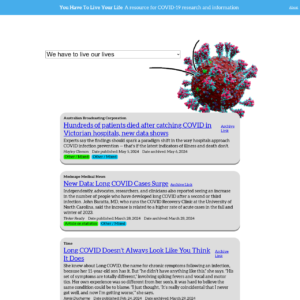You Have To Live Your Life: A resource for COVID-19 research and information
COVID-19 denial is dangerous for both individuals and communities for several important reasons, affecting health, society, and the economy.
Risks to Individual Health
- Delaying Treatment: People who don’t believe in COVID-19 might not get medical help when they feel sick. This can lead to serious health problems or even death because they miss the chance to get treated early.
- Spreading the Virus: Denying COVID-19 often means ignoring safety measures like wearing masks, keeping a distance, or getting vaccinated. This increases the risk of catching and spreading the virus to others.
- Mental Health Issues: Constant misinformation and denial can cause more stress and anxiety, making it harder for people to trust health advice and take care of their mental well-being.
Risks to the Community
- Higher Infection Rates: When people don’t follow health guidelines, more people get sick. This can cause big outbreaks that overwhelm hospitals.
- Overloaded Healthcare: Hospitals may get so full with COVID-19 patients that they can’t care for other patients properly. This can lead to worse outcomes for everyone needing medical help.
- Vaccination Problems: Denial makes people hesitant to get vaccinated, slowing down the process of reaching herd immunity. This keeps the pandemic going longer and gives the virus more chances to mutate.
Societal and Economic Impact
- Longer Pandemic: When people deny COVID-19 and ignore safety measures, the pandemic lasts longer, leading to more lockdowns and economic troubles like job losses and business closures.
- Social Conflict: COVID-19 denial can cause arguments and divide communities, making it harder for everyone to work together to end the pandemic.
- Spread of Misinformation: Denial spreads false information, making it tough to get accurate health advice to people. This mistrust in science and medicine can lead to poor health choices.
Impact on Vulnerable Groups
- Greater Risk for the Vulnerable: Groups like the elderly, those with health conditions, and low-income communities are hit harder by COVID-19. Denial makes things worse for them by increasing their risk of getting sick.
- Resource Access: False information can lead to uneven access to vaccines and treatments, hurting those who need it most.
Long-Term Effects
- Trust in Health Systems: Persistent denial erodes trust in health systems and authorities, making it tough to manage future health crises. Regaining trust takes a lot of effort.
- Education Problems: Misinformation affects schools, disrupting education and spreading false science. This impacts public understanding of health and science for years to come.
In short, COVID-19 denial is harmful because it stops people from getting help, spreads the virus, and makes the pandemic last longer. It creates social and economic problems and hurts the most vulnerable in our society. Fighting denial with clear information and community support is key to overcoming these challenges and ending the pandemic.

